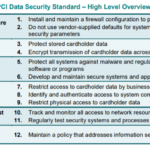Harnessing the power of emerging payment technologies can yield significant benefits for your business. However, it’s crucial to be aware of how they affect your PCI-DSS compliance. Given the intricate nature of this topic, this article will distill the complexity around it, providing a clear picture of how these new capabilities could influence your company’s commitment to secure card payment processing. It will provide you with necessary insights to navigate the maze of technological opportunities without compromising on PCI-DSS mandates.
Defining Emerging Payment Technologies
The landscape of financial transactions is rapidly expanding with the advent of emerging payment technologies. These are advanced, digital forms of payment that are revolutionizing the way transactions are conducted. By offering fast, secure, and convenient alternatives to traditional payment methods like cash or credit cards, these technologies play a crucial role in the transformation of the global financial ecosystem.
Understanding the role of emerging payment technologies
Emerging payment technologies provide innovative solutions that cater to the growing needs of modern consumers. They address the demands for more seamless, contactless, and instantaneous payment experiences. Essentially, these technologies are carving a path towards a future where physical money might become completely obsolete.
The evolution and trends in payment technologies
Payment technologies have come a long way from the traditional cash and check systems. With the constant evolution of technology, various forms of electronic payments emerged, such as debit and credit cards. Now, the trend has shifted towards digital payments with technologies like Digital Wallets, Cryptocurrencies, and Mobile Payments becoming more prevalent in everyday life.
Examples of emerging payment technologies: Digital Wallets, Cryptocurrencies, Mobile Payments
Among numerous innovative payment technologies, Digital Wallets, Cryptocurrencies, and Mobile Payments stand out. Digital Wallets allow users to make transactions digitally through a secure storage system that holds user’s payment information. Cryptocurrencies are a form of digital or virtual currency that uses cryptography for security. Mobile Payments enable transactions through mobile devices, thereby eliminating the need for cash or physical cards.
Understanding PCI-DSS Compliance
In the era of digital transactions, safeguarding customer payment data is pivotal. This is where PCI-DSS Compliance comes into play.
Defining PCI-DSS
PCI-DSS, or Payment Card Industry Data Security Standard, is a set of security standards designed to ensure that companies dealing with credit or debit card information maintain a secure environment, thus protecting sensitive customer information.
Purpose and benefits of PCI-DSS Compliance
The primary purpose of PCI-DSS Compliance is to safeguard cardholder data and reduce the risk of data breaches. Businesses that comply with the PCI-DSS standards demonstrate their commitment to data security, thereby enhancing customer trust and confidence.
Standards and requirements for PCI-DSS Compliance
PCI-DSS encompasses 12 primary requirements, grouped into six categories covering areas like network security, data protection, vulnerability management, access control, monitoring and testing, and information security policies. These requirements, whilst stringent, are designed to fortify the security of cardholder data.
Challenges faced by businesses in maintaining PCI-DSS Compliance
Maintaining PCI-DSS Compliance is challenging, owing to its complexity and the need for continuous monitoring and updates. Businesses often find it difficult to understand and implement the standards, manage numerous requirements, and keep up with the updates.
Connection Between Emerging Payment Technologies and PCI-DSS Compliance
As new payment technologies gain traction, understanding their connection with PCI-DSS Compliance is crucial.
How do emerging payment technologies fit into PCI-DSS
PCI-DSS standards apply to all entities involved in payment card processing, which includes organizations dealing with emerging payment technologies. Therefore, all new technologies must be thoroughly evaluated for compliance with these standards, ensuring they provide adequate security for cardholder data.
The challenges and opportunities of integrating emerging payment technologies to PCI-DSS Compliance
Integrating emerging payment technologies into the existing PCI-DSS Compliance framework presents both challenges and opportunities. Challenges include the complex technical requirements and maintaining the effectiveness of security measures. Opportunities include enhanced security measures, streamlined processes, and improved customer experience.
The importance of considering PCI-DSS Compliance when adopting emerging payment technologies
Ensuring PCI-DSS Compliance while adopting new technologies is vital. It not only maintains the trust of customers but also preserves the integrity of the new technologies, underpinning their success in the market.
Impacts of Mobile Payments on PCI-DSS Compliance
Mobile Payments have had a significant impact on the compliance landscape.
Understanding mobile payments
Mobile Payments facilitate financial transactions through mobile devices. They enable a flexible, convenient, and contactless payment method that is becoming increasingly popular worldwide.
How mobile payments can affect PCI-DSS compliance
Mobile Payments involve the transfer of sensitive data, creating potential vulnerabilities. Therefore, PCI-DSS Compliance must be considered to safeguard customer data. However, the inherent flexibility of mobile payment technologies might pose challenges to achieving compliance.
Case studies of successful PCI-DSS compliant mobile payments models
Many businesses have successfully integrated mobile payments while remaining PCI-DSS compliant. These cases illustrate the possibility of aligning modern payment technologies with existing data security standards, offering valuable insights and best practices.
Impacts of Digital Wallets on PCI-DSS Compliance
Digital Wallets have emerged as a popular form of payment, affecting compliance factors.
Understanding digital wallets
Digital Wallets are applications that store payment information, facilitating quick and easy digital transactions.
Consequences of digital wallets on PCI-DSS compliance
Digital Wallets require stringent security measures due to the sensitive nature of stored data. However, these new technologies must also align with PCI-DSS requirements, creating the challenge of tailoring security methods to fit within compliance standards while still delivering seamless customer experiences.
Examples of successful implementation of digital wallets with PCI-DSS Compliance
In the market, several digital wallets software have effectively integrated with PCI-DSS Compliance. Examples of such successful implementations serve as guidance for businesses looking to venture into this arena.
Impacts of Cryptocurrencies on PCI-DSS Compliance
The rise of cryptocurrencies has presented unique challenges for PCI-DSS Compliance.
Understanding Cryptocurrencies
Cryptocurrencies are digital or virtual currencies, like Bitcoin, which use cryptography for security, thus ensuring the integrity of transactions.
Effect of cryptocurrencies on achieving PCI-DSS Compliance
As with other modern payment technologies, cryptocurrencies present challenges for achieving PCI-DSS Compliance. This is mainly due to their decentralised nature and the complexity of cryptographic technology which may limit some aspects of compliance.
Successful instances of integrating cryptocurrencies with PCI-DSS Compliance
Despite the difficulties, there have been successful instances of integrating cryptocurrencies within the scope of PCI-DSS Compliance. These cases provide valuable insights for businesses considering the adoption of cryptocurrencies.
Emerging Payment Technologies and Data Security
While emerging technologies offer unmatched convenience, they also bring about new data security risks.
The risk posed by emerging payment technologies
Emerging payment technologies, due to their advanced and evolving nature, can present new vulnerabilities for data threats. These risks, if not managed properly, can potentially lead to detrimental data breaches.
The role of PCI-DSS in ensuring data security
PCI-DSS plays a significant role in bolstering data security within these new technologies. By obliging businesses to follow stringent data protection protocols and continuous monitoring systems, PCI-DSS ensures the security of sensitive customer information.
Ways to enhance data security while implementing emerging payment technologies
There are several strategies to enhance data security when adopting these technologies, such as encrypted data traffic, multi-factor authentication, regular testing of security systems, and importantly, ensuring PCI-DSS compliance.
Future of PCI-DSS Compliance with Emerging Payment Technologies
In the face of rapid technological innovation in payments, the future of PCI-DSS Compliance appears promising.
Predictions for future payment technologies and compliance requirements
As payment technologies continue to evolve, particularly with concepts like biometric payments and AI-driven transactions, PCI-DSS Compliance has to keep pace. This will likely involve updates and expansions of the compliance requirements to address upcoming security challenges.
Adapting PCI-DSS for future technologies
The adaptability of PCI-DSS to incorporate upcoming technologies is crucial. This may involve redefining compliance guidelines to suit new technologies, thus ensuring continued protection of cardholder data.
Strategies for maintaining PCI-DSS Compliance amidst advancing technology
To keep abreast with advancing technology, businesses should adopt proactive strategies, such as staying up-to-date with current trends, employing rigorous testing mechanisms, and investing in staff training, with a focus on maintaining PCI-DSS Compliance.
Recommendations for Businesses Adopting Emerging Payment Technologies
While adopting new payment technologies can provide a competitive edge, it is essential to approach this with due diligence.
Exercising due diligence in adopting new payment technologies
Businesses should thoroughly evaluate the security features of any new technology and ensure their compatibility with the existing IT and security infrastructure. Manufacturers and service providers should be thoroughly vetted for their commitment to data security and compliance with PCI-DSS.
Frequent updating and testing of systems for Compliance
With the continuously evolving cyber threat landscape, businesses need to regularly update and test their systems to ensure sustained compliance with PCI-DSS standards. Regular audits are recommended to identify any compliance gaps and rectify them promptly.
Investing in education and training for secure payment platforms
Inculcating a strong security culture within the organization is crucial. Staff training and education programs can aid in understanding the importance of data security and their role in ensuring compliance with PCI-DSS standards when handling new payment technologies.
Closing Remarks on Impact of Emerging Payment Technologies on PCI-DSS Compliance
The impact of emerging payment technologies on PCI-DSS Compliance is a key concern for businesses in the digital era. On one hand, these technologies provide exciting opportunities for customer service innovation. On the other, they present complex challenges for data security. Nonetheless, through proactive strategies, businesses can embrace these technologies while ensuring the safeguard of customer data as defined by PCI-DSS Compliance standards.
In conclusion, navigating the intersection of evolving technology and data security will continue to be a dynamic process. As such, continuous learning and adaptation are crucial. As we look ahead to the future of payment technologies, the role of PCI-DSS in providing a secure transaction environment will be pivotal.










[…] need to be audited for PCI-DSS compliance to ensure they meet the requirements of the […]